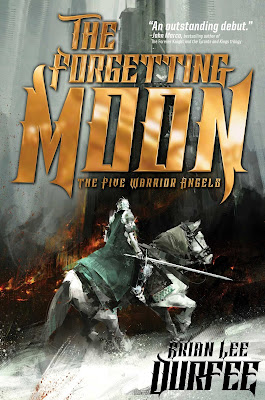GUEST POST: Peter Orullian
Memory as a Weapon by Peter Orullian
What if instead of a fireball, or a lightning bolt, or even a magic missile, what if the weapon you wield . . . is memory.
I’ll grant you, it doesn’t have the sizzle. Or nostalgia. But there’s something potent about it, don’t you think? I mean, if you stop to really think about it. Least ways, there is for me.
Go with me for a moment.
If you’re an adult—somewhere down the beaten path that we call life—there’s a very good chance that where you’ve ended up is not where you meant to be. That doesn’t mean you’re in a rotten place. But . . . It can be true that the weightiest thing, the thing that most burns, is the difference between where you thought you’d be and where you’ve wound up. Mainstream novels often dwell on this topic as a source of emotional wounds and the attempt to reconcile the past with the present.
Even teenagers will lament things they’ve lost, having past from childhood. There’s a magic age around eleven or twelve that represent the last years in which you can still believe in the magic of things before teenage years crush that sensibility. So, then, the teen years roll around, and there’s a sense of loss. Childhood lies broken behind you. The memory of it is already like a sweet nostalgia that you only admit when you’re not posturing around your new, cool teenage friends.
And how did I forget the elderly. Those who are much closer to death have the sweet golden years of reflection. But mortality can be a bear. When you feel its hot breath on your neck, the things you never did or had courage to try make you feel the fool, don’t they. It’s that whole, “You’ll never look back and say, ‘I wish I’d spent more time at work,’ thing.”
And memory, in general, is a strange fellow. If you’re like me, it’s a mix of the best moments—triumphs, even—with moments of failure. Not to mention revelations you never wanted to have . . . about people you care about, about things you hold dear, about losing regard. Perhaps you know what I mean. Perhaps I’m being obtuse, because even now I don’t want to crack those memories open. They hurt too much. Not all of them. But some. And I’ll be damned if I’m drudging that shit up.
So, then, what of fireballs and such in fantasy fiction. Some folks say cracks of lightning and fire are tired. Maybe. I think there’s still some thrill left. But I can tell you that when I set to writing Trial of Intentions, I didn’t have much use for fire or lightning. Instead, the attacks—even in the instance of a certain sword’s power—had to do with memory.
Consider: What is truly yours to keep? What do you have that can’t be taken from you. Money?
 |
| Trial of Intentions Out Now |
I’m reminded of Andy Dufresne in Shawshank Redemption, who in turn reminded his friends, after a month in the hole, that the “powers that be” couldn’t take music from him. “I had Mozart to keep me company,” he says, of his long stretch in the hole.
See what I mean? In this instance, Andy’s talking about music, which by itself is extremely powerful, even in memory.
But I think at a slightly more abstract level what Andy’s saying is that those things that live inside us—in our heads and hearts—aren’t for sale, can’t be snatched or imprisoned.
Which is precisely why I have made that the power of some of my weapons in Trial of Intentions. Precisely an object of attack by some of my “bad guys.”
I invite you to see what I’ve done in Trial. Then, should you come with me on this journey, you’ll see how it evolves in the next volume.
In any case, while I still write war, and swords, and bone-crunching battles, there’s an attack and prize that sits above the physical.
Memory. A thing of immense potency. The soul-crushing kind.






Comments
Post a Comment